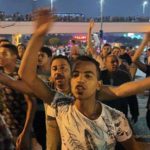- Stay Connected
In rare protests, Egyptians demand President el-Sisi’s removal
Rallies in several Egyptian cities after businessman Mohamed Ali accused el-Sisi of corruption, called for resignation.

Thousands of pro-democracy protesters marched in cities across Egypt on Friday, demanding the resignation of President Abdel Fattah el-Sisi.
Videos posted on social media showed demonstrators chanting “rise up, fear not, Sisi must go” and “the people demand the regime’s fall” late on Friday.
Protests were reported in the capital Cairo, the second-biggest city of Alexandria and Suez.
Officers in civilian uniforms confronted the demonstrators who tried approaching Cairo’s Tahrir Square, where mass protests started in 2011 which toppled Hosni Mubarak.
Al Jazeera is banned from reporting from inside Egypt, but there were several reports of arrests made in the capital, and tear gas being used on demonstrators.
The demonstrations came after self-exiled Egyptian businessman and actor Mohamed Ali accused President el-Sisi of corruption and called on people to take to the streets and demand the leader be removed. El-Sisi has dismissed the allegations as “lies”.
“If el-Sisi does not announce his resignation by Thursday, then the Egyptian people will come out to the squares on Friday in protest,” Ali said in a video posted on Tuesday.
Translation: “Rise up, fear not, Sisi must go”
Ali first began posting his videos on September 2. His latest videos have been viewed hundreds of thousands of times and has turned him into a public figure in his homeland.
In a video on Friday that was published as protests were gaining momentum, Ali encouraged people to stand strong and continue demanding their rights.
“God is great … enough already, I want to come back to Egypt. I miss Egypt and my people. May God strengthen your resolve,” he said.
Yehia Ghanem, Al Jazeera’s Middle East analyst, said he “definitely” believes Friday’s protests represent a different level of momentum among Egyptians.
“What is happening in Egypt now is a long overdue movement … to rid the country from tyranny,” he said.
Dalia Fahmy, an associate professor at Long Island University and a senior fellow at the Center for Global Policy in Washington DC, said these protests were very different from the 2011 Revolution.
Fahmy said on the one hand it was suprising to see people break the fear barrier, but it was to be expected.
“If we look at the population today, of a hundred million people the average age is 23. Now if you subtract eight which was when the revolution happened, it means the average age was 15,” she said.
“When you have much of the population that doesn’t live with the post-revolution trauma or memories, you have a group of young people coming in with a different set of demands and different kinds of understanding of a future possibility. So those on the streets today are very different from the ones that were there eight years ago.”
Friday’s protests were a rare public display of dissent in the country. Egypt outlawed all unauthorised demonstrations in 2013 after el-Sisi, as defence minister, led the military’s overthrow of democratically-elected President Mohamed Morsi following mass protests.
Authorities could not be immediately reached to comment and national TV did not cover the incidents.
A pro-government TV anchor said only a small group of protesters had gathered in central Cairo to take videos and selfies before leaving the scene. Another pro-government channel said the situation around Tahrir Square was quiet.
Since el-Sisi came to power in 2014, economic austerity measures have been introduced, helping to reboot an economy battered by the 2011 Arab Spring. But the poverty rate has soared.
According to official statistics, released in July, one in three Egyptians lives in poverty.
Human Rights Watch has said that since el-Sisi secured a second term in 2018, “his security forces have escalated a campaign of intimidation, violence, and arbitrary arrests against political opponents, activists.”
United Nations experts have previously stated their “grave concern” over a widening “assault on freedom of expression” in Egypt, which includes blocking scores of news websites and the unlawful detention of journalists and dissidents.
